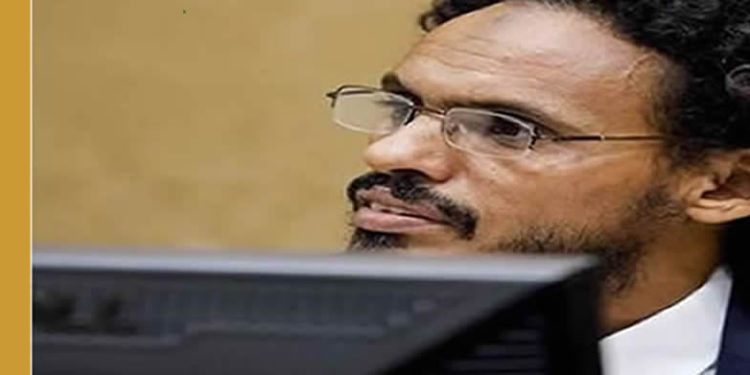Ahmad al-Faqi al-Mahdi, whose crimes against humanity charges for destroying tombs in Timbuktu were confirmed by the ICC judges, had told the court that he wished to plead guilty.
ICC Prosecutor Fatou Bensouda said that Al Faqi’s decision is the first time a suspect has stated the intention to plead guilty in a case before the ICC.
“Such an admission of guilt, provided for in Article 65 of the [Rome] Statute, will be a milestone in the history of the ICC,” said Bensouda.
Al-Mahdi, a former teacher, had expressed the wish to plead guilty during a closed session of the court on March 1, according to Bensouda, but this fact could only be made public now. Pre-Trial Chamber I of the International Criminal Court confirmed charges against Al-Mahdi for the destruction of historical and religious monuments in Timbuktu (Mali), and committed Mr Al Mahdi to trial before a Trial Chamber.
Pre-Trial Chamber I is composed of Presiding Judge Joyce Aluoch, Judge Cuno Tarfusser and Judge Péter Kovács. The decision confirming the charges can be appealed only with the authorisation of Pre-Trial Chamber I. The ICC Presidency will assign the case to a Trial Chamber in due course.
The Chamber found that the evidence presented by the Prosecutor is sufficient to establish substantial grounds to believe that Mr Al Mahdi is criminally responsible,
pursuant to article 25(3)(a) (perpetration and co-perpetration); article 25(3)(b) (soliciting, inducing); article 25(3) (c) (aiding, abetting or otherwise assisting) or article 25(3) (d) (contributing in any other way) of the ICC Rome Statute, for the commission of a war crime alleged by the Prosecutor regarding intentionally directing attacks against the following buildings: the mausoleum Sidi Mahamoud Ben Omar Mohamed Aquit, the mausoleum Sheikh Mohamed Mahmoud Al Arawani, the mausoleum Sheikh Sidi Mokhtar Ben Sidi Muhammad Ben Sheikh Alkabir, the mausoleum Alpha Moya, the mausoleum Sheikh Sidi Ahmed Ben Amar Arragadi, the mausoleum Sheikh Muhammad El Mikki, the mausoleum Sheikh Abdoul Kassim Attouaty, the mausoleum Ahmed Fulane, the mausoleum Bahaber Babadié, and Sidi Yahia mosque (the door).
The confirmed charge concerns a crime allegedly committed in Timbuktu between around June, 30, 2012 and around July 11, 2012. The chamber indicated that the targeted buildings were regarded and protected as a significant part of the cultural heritage of Timbuktu and of Mali and did not constitute military objectives.
They were specifically identified, chosen and targeted precisely in light and because of their religious and historical character. As a consequence of the attack, they were either completely destroyed or severely damaged. Their destruction was considered as a serious matter by the local population.
The chamber based its decision on the evidence presented to it by the prosecutor and by the defence which included witnesses’ testimonies,
video materials, imagery materials, experts’ analyses, official documents emanating from Malian authorities and international organisations (including UNESCO) and media reports
It is alleged that Mr Al Mahdi, was an active personality in the context of the occupation of Timbuktu. He allegedly was a member of Ansar Eddine, a mainly Tuareg movement associated with Al Qaeda in the Islamic Maghreb (AQIM), working closely with the leaders of the two armed groups and in the context of the structures and institutions established by them.
It is alleged that, until September 2012, he was the head of the “Hisbah” (body set up to uphold public morals and prevent vice), set up in April 2012. He was also associated with the work of the Islamic Court of Timbuktu and participated in executing its decisions. It is alleged that he was involved in the destruction of the buildings mentioned in the charge. Mr Al Mahdi was surrendered to the ICC on 26 September 2015 pursuant to a warrant of arrest issued on 18 September 2015. The confirmation of charges hearing in this case took place on 1 March 2016.
Fact File
1. Timbuktu, known as the “City of 333 Saints,” housed 13th century monuments that were believed to protect the locals from danger. The mausoleums were shrines of the ancestor saints, or founding fathers, and were venerated by the people of Timbuktu.
2. In the 15th and 16th Centuries, Timbuktu became one of the intellectual and spiritual capitals of Africa. It played an essential role in the expansion of Islam; it was the cradle of education, a place of enlightenment, for generations of students, and attracted many scholars, some of whom are considered Muslim saints. Following their deaths, mausoleums were erected in their honour, and to celebrate their contributions.
3. The destruction of such monuments constitutes the annihilation of structures that had survived the ravages of time and which stood as testimony to Timbuktu’s glorious past and important place in history and to its people over generations.
4. Beyond Mali, the sites attacked were not only important for the people of Timbuktu and Mali. They were also important for the whole of Africa and the entire world.
5. It is rightly said that “cultural heritage is the mirror of humanity.” Such attacks affect humanity as a whole. We must stand up to the destruction and defacing of our common heritage.
6. As a matter of fact, with one exception, all of sites in Timbuktu had been designated by UNESCO as World Heritage sites. This is because, beyond the borders of Mali and Africa, the mausoleums constituted a chapter in the history of humanity. Humanity as a whole was affected by this loss.







